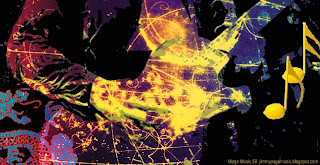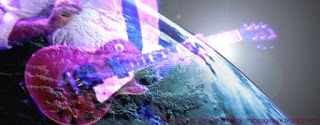~ Jareth, the Goblin King (Labyrinth 1986)
Mage Music 58
 Rituals of Magick can take many forms – theoretically, an infinite number of them. Each ritual is specific for a time and space in which it occurs - including the state of the soul of the individual performing it - so there is no one recipe for Magick that will do the job. And of course, Magick isn't truly about changing the world. What it really is about is the Mage’s becoming a different person in a preferred world.
Rituals of Magick can take many forms – theoretically, an infinite number of them. Each ritual is specific for a time and space in which it occurs - including the state of the soul of the individual performing it - so there is no one recipe for Magick that will do the job. And of course, Magick isn't truly about changing the world. What it really is about is the Mage’s becoming a different person in a preferred world.
What all this means is that no one can ever know the true workings of Magick in any ritual that is not their own. Magick is a thing of the Mage’s mind and soul. No one can know the true symbolic meanings of the objects or the actions of someone else’s desire and will, particularly since each instance of Magick is its own thing, blossoming into the world once to never exist again. Oh, anyone can see how things are placed in a ritual, they can hear the sounds, they can follow the progression - but they can never know the true symbolic relationships that the Mage has set for that specific instance in time and space. Not unless they are truly psychic and living in the Mage's brain... which no doubt the Mage would have something to say about.
Thank goodness this doesn't mean that others can’t bask in the glow of a Mage's work. In fact, the radiance of Magick that can be seen or heard or felt can be borrowed, in a way.
It’s true - you don’t have to be a Mage to use Magick. In fact, those who are changed by the music of, say, Jimmy Page, are actually doing Magick themselves - even without being a Mage. With sufficient will and desire, a person can use the Magick of a Mage's ritual to prime the Magickal pump, so to speak.
Metagame Magick - Recipe for Ritual
You still have to follow the rules of Magick, though. Magick isn't random - it is the purposeful bringing about of change in reality. One result is that while you can follow all sorts of recipes for a ritual, and you can even borrow the Magick of a ritual, the symbols must still be yours, they must have true and personal meaning for you. You still have to have the desire and the will, and even though the ritual is borrowed, you still have to understand it and own it yourself.
The recipe for ritual can be as simple as playing a game.
The recipe for ritual can be as simple as playing a game.
Metagaming is game strategy that transcends the regular playing rules. The term refers to the game universe outside of the game itself - just like how Magick refers to the planes of reality outside of itself. Metagaming is using knowledge beyond the characters (in role-playing) or the assigned meanings of the game pieces to change the way the game works within itself. It is a layer over the game that is a game-changer.
Just like Magick.
Here’s a down and dirty example of metagame Magick using Solitaire (2 colors) as ritual.
- First you just play, hoping to win.
- Then you play hoping to see the patterns.
- Then you use the patterns while playing to tell you something about how the world beyond the game works.
- This starts to influence how the cards come out, as you infuse the process with desire and will.
- And then you can manipulate the game to influence the world.
You have to play a lot of solitaire to get to the level of skill that lets you put your attention to other levels of reality at the same time you are moving cards. I believe that you may have heard examples of that level of skill in music before.
♫
* Background of the top image is neutrino sub-atomic particle tracings. They look like arcane alchemist calculations, don't they.
♫
Added 06/24/13:
Q:
"If there is no one recipe for Magick, and no one can know the workings of Magick in a ritual not their own, how does this fit with teaching the young magician -- eg, Hogwarts?"
A:
If magic exists in the real world, it both is and isn't like Hogwarts.
It is like Hogwarts in its similarity to how schools teach a kid to play a musical instrument - fingerings, the proper way to hold the instrument, how to read music. However,in the end the kid isn't being taught music but rather the craft of playing an instrument.
A kid can get 12 years of musical instruction and still be a lousy musician because the music isn't something that is taught, it's something that a person finds in herself and feels compelled to bring out.
The craft of making music is a skill but it isn't the music itself. So too with Magick. The Hogwarts image of teaching young magicians could easily lead to a misunderstanding as to what is really going on.









